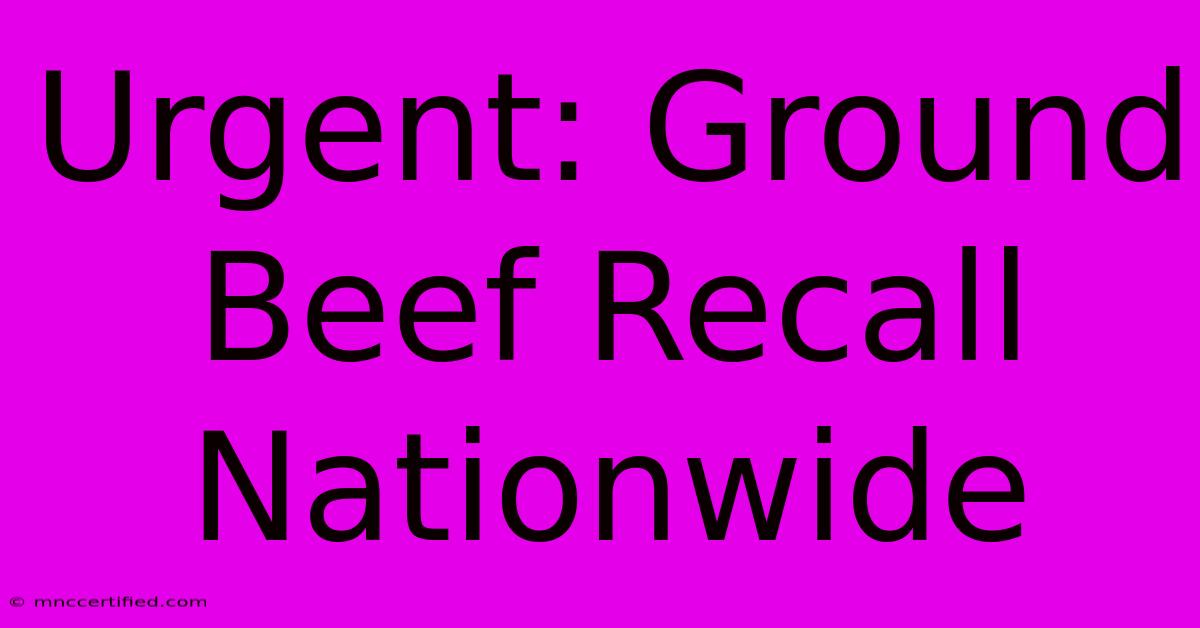Urgent: Ground Beef Recall Nationwide

Table of Contents
Urgent: Nationwide Ground Beef Recall – What You Need to Know
A major ground beef recall is underway, impacting millions of consumers across the nation. This article provides crucial information on how to identify affected products, what to do if you've purchased them, and steps to take to protect your family's health.
Understanding the Recall
Several major meat processing plants have recently issued urgent recalls of their ground beef products due to potential contamination with [Specify the contaminant, e.g., E. coli, Salmonella]. This contamination poses a serious health risk, potentially leading to severe foodborne illnesses. The scale of the recall is significant, affecting various brands and packages sold nationwide through major grocery store chains and retailers.
Identifying Affected Products
The recalled ground beef products are identified by specific production dates, package codes, and lot numbers. These details are crucial for determining if you possess any affected items. Check the packaging carefully for:
- Brand Name: [List specific brand names involved in the recall, linking to official recall notices if available. E.g., "Brand X," "Brand Y"]
- Product Description: [Specify product descriptions, e.g., "Ground Beef," "Lean Ground Beef," "80/20 Ground Beef"]
- Packaging Code: [Explain where to find the code and its format. E.g., "Look for a 10-digit code printed on the package label."]
- Production Date: [Specify how the date is formatted and where to find it.]
- Establishment Number: [Explain the significance and location of the establishment number.]
It's crucial to verify the specific details provided by the official recall announcement released by the [USDA's Food Safety and Inspection Service (FSIS) or relevant authority]. This article provides general information; always refer to the official source for the most accurate and up-to-date information.
What to Do If You Have Recalled Ground Beef
If you have purchased ground beef matching the details of the recalled products, do not consume it. Instead, take the following steps:
- Locate the product: Find all packages of ground beef that match the recall description.
- Discard the product: Dispose of the affected ground beef immediately. Do not attempt to return it to the store if the official recall instructions advise against it. Double-bag it and place it in your outdoor trash can.
- Clean your surfaces: Thoroughly clean any surfaces (counters, cutting boards, utensils) that came into contact with the recalled ground beef using hot, soapy water.
- Check your refrigerator and freezer: Carefully check your refrigerator and freezer for any other potentially affected products. If you're unsure, err on the side of caution and discard.
- Monitor your health: Keep a close eye on yourself and your family for symptoms of food poisoning, such as nausea, vomiting, diarrhea, or fever. If symptoms develop, consult a doctor immediately.
- Report the product: In some cases, you might be able to report the recalled product to the store or the relevant authority.
Preventing Future Foodborne Illnesses
This recall highlights the importance of practicing safe food handling techniques. Remember to:
- Wash your hands: Thoroughly wash your hands with soap and water before and after handling raw meat.
- Cook thoroughly: Cook ground beef to an internal temperature of 160°F (71°C) to kill harmful bacteria.
- Store properly: Refrigerate ground beef promptly and use it within 1-2 days.
Stay Informed
This is a rapidly evolving situation. For the most up-to-date information on the ground beef recall, regularly check the website of the [USDA's Food Safety and Inspection Service (FSIS) or relevant authority]. Subscribe to their alerts or follow their social media channels for immediate updates. Your health and safety are paramount.
Keywords: Ground beef recall, nationwide recall, food safety, food poisoning, E. coli, Salmonella, USDA, FSIS, foodborne illness, meat recall, recall notice, food safety tips, ground beef contamination, product recall, consumer alert, urgent recall, health alert.
(Note: This article is for informational purposes only and does not constitute medical or legal advice. Always refer to official sources for the most accurate and up-to-date information.)

Thank you for visiting our website wich cover about Urgent: Ground Beef Recall Nationwide. We hope the information provided has been useful to you. Feel free to contact us if you have any questions or need further assistance. See you next time and dont miss to bookmark.
Featured Posts
-
Womens Match Preview Arsenal Vs Juventus
Nov 22, 2024
-
New Russian Missile Hits Ukraine Putin Confirms
Nov 22, 2024
-
Live And Invest Overseas Reviews
Nov 22, 2024
-
Smollett Case Supreme Court Ruling
Nov 22, 2024
-
Arrest Warrants For Netanyahu Gallant
Nov 22, 2024